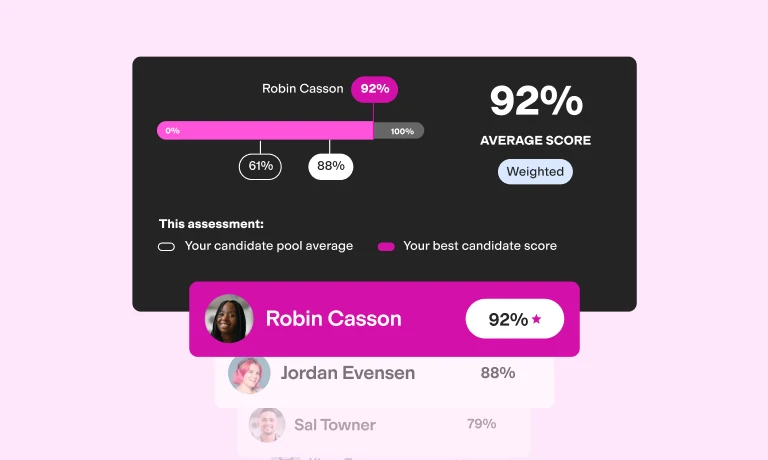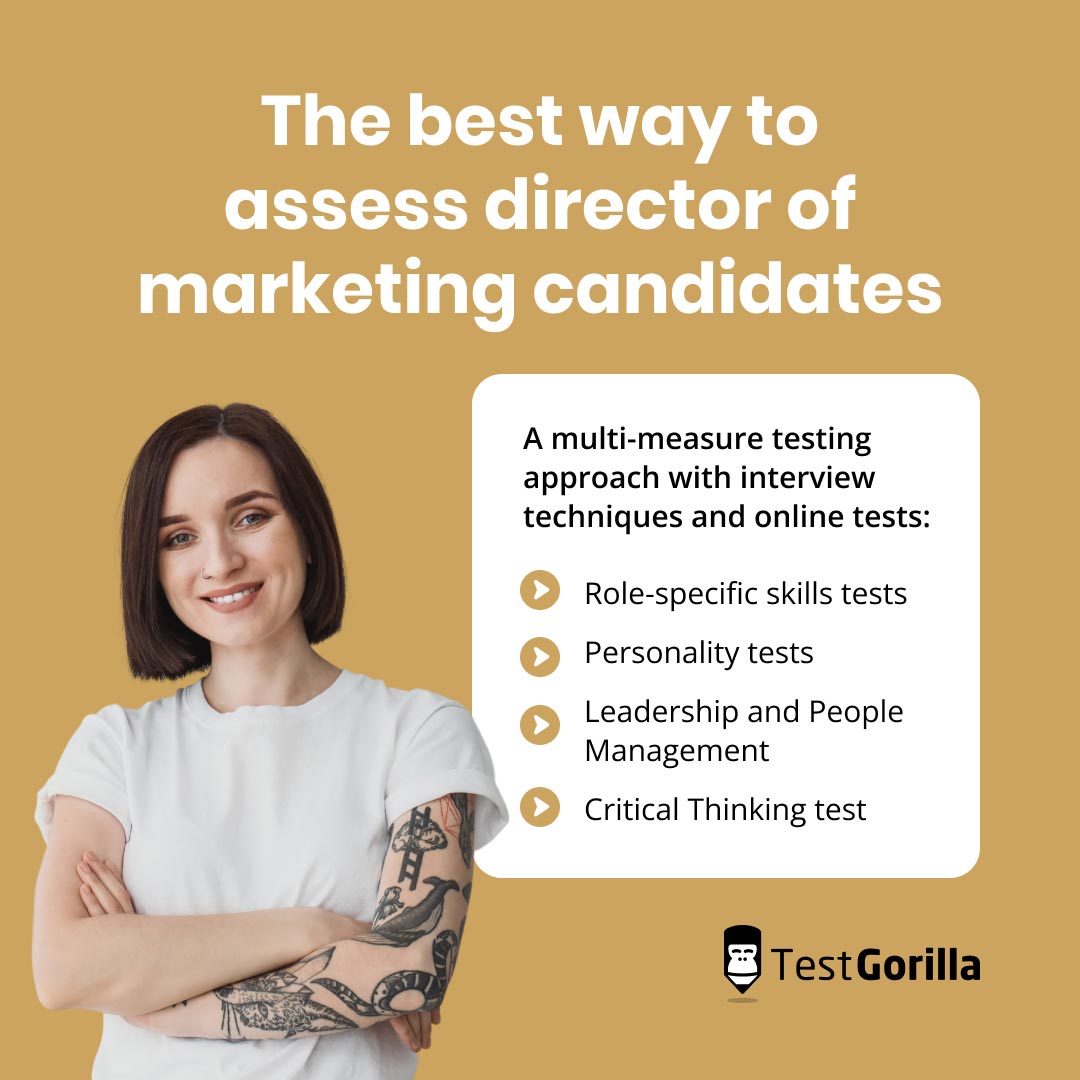12 interview questions for director of marketing roles
Hiring the wrong director of marketing can be detrimental to your company. They may implement poor marketing strategies, waste resources, and miss significant opportunities – putting your company at a competitive disadvantage. Further, marketing blunders can also irreversibly damage your brand reputation.
Finding a reliable method for evaluating a candidate’s skill set, attributes, and thought processes is essential before hiring them for this important role.
Pertinent interview questions for director of marketing roles are an effective way to do this. With the right questions, you can assess a marketing director candidates’ skills, past experiences, technical abilities, core traits, and more, giving you powerful insights you wouldn’t get from simply scanning their resumes.
In this guide, we share 12 great interview questions and tips on what to look for in candidates’ answers. Furthermore, we discuss the best tests for a director of marketing role so you can ensure you get it right the first time.
Table of contents
- What are director of marketing interview questions?
- Why is it important to conduct interviews for marketing director roles?
- 12 interview questions for director of marketing roles (plus answers to look for)
- The best way to assess director of marketing candidates
- How TestGorilla can help you find the best director of marketing for your company
What are director of marketing interview questions?
Director of marketing interview questions aim to assess candidates' suitability for the role, focusing on their skills, experience, and qualities.
These questions evaluate a candidate’s:
Background and prior experiences in marketing
Technical skills and knowledge in brand management, traditional marketing, digital and social media marketing, search engine optimization (SEO), and more
Behavioral traits such as creativity, tech-savviness, and leadership
Situational judgment across different scenarios that marketing directors face
Analytical skills and ability to work with data
Budget management skills
These interviews aim to gain powerful insights that could help predict candidates’ future performance in the role.
Why is it important to conduct interviews for marketing director roles?
Below, we explore some advantages of conducting interviews for a marketing director role.
1. Verify candidates’ knowledge and experiences
Resumes can tell you about a candidate’s background and experiences, but there’s no way to assess the extent of their knowledge and determine their true abilities.
The right interview questions, however, ask candidates to provide concrete examples of their prior experiences and test their technical expertise in marketing. This strengthens your recruitment and selection process and reduces the chance of mis-hiring.
2. Check if candidates are culturally aligned with your company
In addition to assessing candidates’ skills and past experiences, you must ensure your marketing director is culturally aligned with your company’s people and working practices. You can ask candidates for real-life examples of their experiences to assess their ability to lead and manage other marketing managers.
Interviews also help you assess candidates’ observable behavioral traits, such as charisma and presentability, to ensure you get a complete picture before making hiring decisions.
3. Predict candidate performance in the director of marketing role
Situational judgment questions are an effective way to assess how candidates would respond to the challenges that marketing directors face. This is a reliable indicator of how they’d think and act in similar scenarios in the future.
These questions also provide a great opportunity to test candidates on qualities such as creativity, original thinking, and budget management – all of which are key strengths that candidates should possess to succeed in the role.
4. Promote fair hiring practices
A well-thought-out set of interview questions helps distinguish between candidates with similar backgrounds by diving deeper into their skill sets and traits. The additional insights gained in interviews help to eliminate favoritism, gender bias, and other unconscious biases inherent to hiring processes.
The best insights on HR and recruitment, delivered to your inbox.
Biweekly updates. No spam. Unsubscribe any time.
12 interview questions for director of marketing roles (plus answers to look for)
Here are 12 novel interview questions you can ask your marketing director candidates and our tips on what to look for in their answers.
Background and experience
1. Can you describe your career journey in marketing and how your previous roles have prepared you for this position?
Look for candidates who demonstrate:
Years of experience and quality career progression that align with the job description
Specific examples connecting their background to the requirements of the position
A thirst for continuous learning and growth in their careers
2. Discuss how you've had to collaborate with cross-functional marketing teams in previous roles.
Prioritize applicants who:
Can provide concrete examples of successful collaborations with other marketing teams, such as sales, product development, brand design, and so on
Show they’re able to bridge communication gaps and other challenges between different departments
Have a track record of bringing teams together to achieve a common goal
Behavioral attributes
3. Share an example of a particularly creative marketing campaign you spearheaded and how you contributed to its success.
Promising candidates will:
Demonstrate their ability to think outside the box and generate unique ideas
Share detailed insights into how their creativity translated into tangible results
Explain clearly what role they played and how they motivated other team members to work toward the success of the campaign
4. Discuss an example of a time when you successfully led your team to achieve a very ambitious goal. How did you motivate them, and what was the outcome?
Look for evidence of:
The candidate’s leadership skills and particularly their ability to set and communicate ambitious goals
Specific strategies they employed to inspire their team and delegate work to other marketing professionals
Quantifiable results and outcomes they achieved from the project
Situational judgment
5. Imagine a situation where a major social media platform undergoes a significant algorithm change that impacts your organic reach. How would you adapt your social media strategy to remain effective?
Progress candidates who have:
A clear understanding of how social media algorithms work and how changes can impact social media strategies
The ability to be adaptable, flexible, and think on their feet
A well-planned strategy they can implement, such as considering alternative channels or making suitable changes to campaigns on the impacted channel
6. Imagine a scenario where your company faces a PR crisis due to a social media mishap. How would you handle the crisis and retain a positive brand image?
Look for answers that showcase:
The candidate’s crisis management skills with a clear and structured response plan
Evidence of prior experience in damage control and crisis communications
An emphasis on transparency and accountability in addressing the issue
Marketing knowledge and expertise
7. What steps would you take to develop a comprehensive marketing technology stack for your company?
Prioritize candidates who demonstrate:
A clear and in-depth understanding of the marketing technology landscape
Strategic thinking around selecting and implementing marketing tools
Consideration of the organization’s specific needs and goals
8. How do you approach SEO and ensure your digital content ranks well and drives organic traffic?
Promising candidates will:
Have a firm grasp of how SEO works and best practices
Think quickly and create a clearly defined SEO strategy
Show a deep understanding of content optimization and keyword research
Data, analytics, and technology
9. How can you use data and analytics to measure the effectiveness of your marketing campaigns?
Look for candidates who exhibit:
Proficiency in understanding and using various data analysis tools
A results-oriented approach to measuring the effectiveness of campaigns
A knack for using data for decision-making and optimizing campaigns
10. Describe how you could leverage AI or machine learning (ML) in marketing. How do you see these technologies impacting the future of marketing?
Prioritize candidates who have a solid understanding of:
Specific ways in which these technologies can be leveraged in marketing campaigns
The benefits and challenges of AI and ML in marketing
How these technologies will shape the future of marketing
Budget management
11. What key marketing metrics and KPIs do you consider most important for tracking the effectiveness of your budget allocation?
Good answers will show:
An awareness of key financial and performance metrics in marketing
A clear strategy to optimize budget allocation based on performance data and KPIs
Overall strategic thinking regarding resource allocation
12. If you need an increased marketing budget, how will you make a compelling case to senior leadership, balancing cost and expected ROI?
Promising candidates will demonstrate:
Strong financial acumen and budgeting skills
Influencing skills with a clear strategy for persuading key stakeholders
The use of quantifiable information and metrics to show ROI potential
The best way to assess director of marketing candidates
While interviews bring many benefits to the hiring process, they shouldn’t be the only technique used to make recruitment decisions. Interviews can only take you so far when it comes to reliably assessing skills, technical abilities, and personality traits.
The best way to assess your marketing director candidates is to use a multi-measure testing approach, incorporating online tests and interview techniques with a platform like TestGorilla.
We recommend these tests for the director of marketing role:
Role-specific skills tests such as SEO copywriting, market analysis, branding strategy, and so on
Personality tests to assess how the candidate will fit into your company
The Leadership and People Management test to evaluate a candidate’s suitability to lead other marketing professionals and teams
The Critical Thinking test to assess analytical and deductive reasoning skills
In addition, you can choose other relevant tests from TestGorilla’s extensive library of 300-plus tests to create a tailored hiring process for this role.
You can combine your customized assessment with a one-way video interview using our suggested questions to get a complete picture of a candidate’s strengths and development points.
How TestGorilla can help you find the best director of marketing for your company
Marketing directors play a pivotal role in acquiring, engaging, and retaining your customers. If you hire the wrong individual for this role, you can be left with a loss in revenue, missed opportunities, and resentful team members.
Thus, creating an airtight hiring campaign for your marketing director position is critical. The best way to do this is by combining pre-employment screening tests and interviews for a complete candidate profile.
TestGorilla offers role-specific skills tests, personality and culture assessments, cognitive ability tests, situational judgment tests, and more – all from the same platform. Online assessments provide an objective way to screen candidates for the core qualities required for the role before you invest time and resources in interviewing them.
Sign up for a free plan, take the product tour, or request a free 30-minute live demo to explore everything TestGorilla offers.
You've scrolled this far
Why not try TestGorilla for free, and see what happens when you put skills first.



















